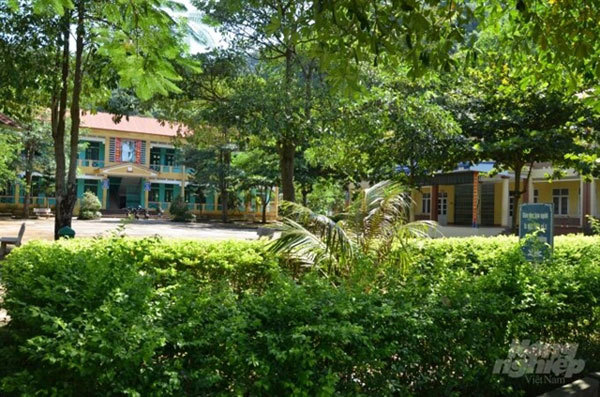Man donates family cemetery land to build school
ABO/VNS - Hundreds of students and teachers of Xam Khoe Secondary have received an education over the last decade, thanks to Ha Minh Thiet's donation of nearly 8,000 sq.m of his family’s cemetery land in 2010.
to build the school in Mai Chau District’s Xam Khoe Commune, the northern province of Hoa Binh.
Ha Van Thuan, principal of the school, said the students of the secondary school always had to study in the afternoon because the school had to share a location with Xăm Khoè High School between 1999 and 2009.
The secondary school’s management had been unable to find a large enough location in the commune’s downtown for students to use as a school, he said.
Classes often started from 1pm after the teacher just finished lunch and rushed to class and the students were studying while dozing off, he said.
 |
| The new school locates in the land donated by Ha Minh Thiet in in Mai Chau District’s Xam Khoe Commune, the northern province of Hoa Binh. — Photo nongnghiep.vn. |
Pham Van Phong, chairman of the commune People’s Committee, said local officials had a headache because they could not find a suitable place to build the school for 10 years. Some places were too small; others were too far.
In 2010, Thiet was chairman of the commune’s Fatherland Front and said he would persuade his family members and relatives to donate all 8,000 sq.m of his family’s cemetery land, worth billions of dong, to build the school.
Thiet, 66, a Thai ethnic man, said he was in the army between 1968 and 1977. He just finished the 7th grade when he started his service and could not finish his studies due to the wars.
Therefore, he always wanted his children and the next generation in the commune to enjoy their education, he said, so he decided to donate the land.
However, doing so meant his family had to move 11 graves in the cemetery to other places, Nông Nghiệp Việt Nam (Vietnam Agriculture) online newspaper reported.
“That was a big problem,” he added.
At first, when Thiet spoke to his family members and relatives, they were strongly opposed, especially his mother.
Thai people have a long-held belief that when a person has died, they must be buried deeply and their grave must never be removed at any cost, lest their living relatives face misfortune.
Thiet felt discouraged but did not give up.
He tried to talk with his mother about the importance of studying and his hope that the next generations could enjoy their school time so that they could become good citizens and contribute to the town.
“I tried many times to persuade my mother,” he added.
Eventually, his 94-year-old mother agreed and helped him persuade other relatives to donate the land, he said.
Finally, the graves were removed to the family's farming land, he said.
The building of the new school was finished in 2011 with eight classrooms and several specialised rooms, including a health care room and computer room, encouraging both the teachers and students of the school.
Principal Thuan said when students studied in the new school, teaching and learning activities showed significant improvements.
In the past, the school only had 3-4 students that won the excellent student award at the district level, but the number was 20 students each year since 2011 to now, he said.
“It is partly because the students study in a new and comfortable school,” he said.
The school has also been recognised as a national-standard school since 2017, he said.
Phong, chairman of the commune People’s Committee, said Thiet was a good example for local people.
After he donated the land, many local residents also donated their land for public purposes such as building the commune’s police station and tax office, he said.
(Source: VNS)
 về đầu trang
về đầu trang







